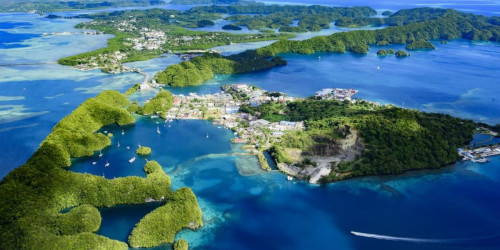Liam Saddington is a political and environmental geographer whose research focuses on the geopolitics of climate change concerning small island states and rising sea levels.
Research
1) Climate Change, Geopolitics and Small Island States
His work explores how the relationship between territory and statehood is being reimagined in low-lying atolls in light of rising sea levels. It examines how space and time shape understandings of climate change and the implications for critical geopolitics, adaptation, and diplomacy.
Liam is interested in how different forms of knowledge are mobilised in controversies over the futures of atoll states. Specifically, he is interested in how vertical geopolitics and geographies of the ocean intersect in the construction of atoll states as “sinking islands” and resistance to this term. His DPhil (PhD) thesis was entitled “Rising Seas and Sinking Islands: The Geopolitics of Climate Change in Tuvalu and Kiribati”.
Liam’s ESRC Postdoctoral Research Fellowship was entitled “Prefiguring the Future: Climate Adaptation and Youth Diplomacy in Tuvalu”. Building on his doctoral research, this project has two focuses. Firstly, on the role that land reclamation plays in climate change adaptation in low-lying atoll states and its broader geopolitics. Secondly, the role of youth and youthful bodies within Tuvaluan climate diplomacy.
His current research thinks about the changing role of the UK as an environmental actor in the South Pacific, in light of the “Pacific Uplift” that the UK has initiated as part of “Global Britain”. Drawing on archival materials, Liam is tracing how historical narratives of environmental degradation, population displacement and marginality in British colonies in the South Pacific influence contemporary climate discourses.
2) Simulations and Pedagogy in Political Geography
Since 2016, Liam has worked with Fiona McConnell (University of Oxford) on developing ‘Model UNPO’ teaching resources for primary and secondary schools. Supported by a University of Oxford’s Public Engagement with Research Seed Fund Award, they adapted the materials for work with diasporic communities. As part of this project, Liam has been part of the preparatory team organising a weeklong session at the Council of Europe entitled “Unrepresented Diplomats: A Study Session for European Minority Youth on Shrinking Civic Space, Political Participation and Freedom of Association”.
Within their research, Fiona and Liam are interested in bringing together literature on the geographies of education and learning with work in political geography on the nature of stateness to think about how the geographies of play can help young people to make sense of the contemporary political world. Supported by a Cambridge Humanities Research Grant, Liam is currently undertaking participant observation in primary and secondary schools.
3) Youth and Climate Justice
Climate change is of increasing concern for young people – evidenced by the rise of eco-anxiety. Liam is interested in how young people think about the future and climate change, with a particular focus on climate justice. Liam is undertaking participatory research working with schools, teachers and pupils to explore how young people conceive of what a just climate future might look like.
Currently supported by an RGS-IBG Innovative Teaching Grant, Liam is currently collaborating with Gerard Reilly (Marriotts School, Stevenage) and Miles Huppatz (Hampton Gardens School, Peterborough) to develop a scheme of work focusing on the human geographies of climate change for Year 9 pupils. Pupils will be introduced to ideas of climate mobility, climate justice and sustainability.
Currently supported by the Newton Trust, Liam is also contributing to a project led by Rachel Thorley (Churchill College) on developing a climate action toolkit for primary school students. This will be a cross-disciplinary programme on climate change which will develop subject interests across Arts, Humanities and STEM through a structured scheme of work with free, downloadable resources and hands-on resources.
Publications
Journal articles
2023
- Saddington, L., 2023. Geopolitical imaginaries in climate and ocean governance: Seychelles and the Blue Economy. Geoforum, v. 139, p.103682-. doi:10.1016/j.geoforum.2023.103682.
- Saddington, L., 2023. The chronopolitics of climate change adaptation: land reclamation in Tuvalu. Territory Politics Governance, v. ahead-of-print, p.1-20. doi:10.1080/21622671.2023.2216732.
- Saddington, L. and McConnell, F., 2023. Debating global governance: resources to engage A level students with geopolitics. Teaching Geography.
- Saddington, L.R. and Hills, T., 2023. Geopolitics and humiliation: The ‘sinking islands’ of Tuvalu. Political Geography, v. 105, p.102938-. doi:10.1016/j.polgeo.2023.102938.
2020
- Saddington, L., 2020. If everyone returned, the island would sink: Urbanisation and migration in Vanuatu. Island Studies Journal.

